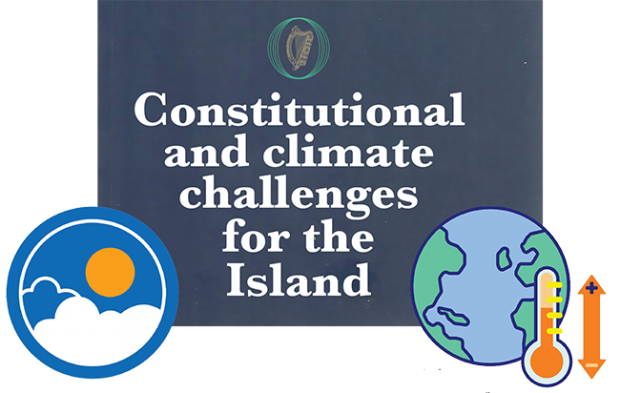20 May 2021 Edition
Constitutional and climate challenges for the Island

Climate change, extreme weather, and the sea rising do not respect borders. The climate and biodiversity crisis does not give a monkey’s if you’re Catholic, Protestant or Dissenter. Biophysical science is no respecter of human-made, non-natural, artificial lines on a map.
Indeed, from a pure scientific or earth-based point of view, the map is definitely not the territory, and natural systems and processes operate within and on territories, not abstract human creations such as maps, nation-states, and contested histories. And Mother Nature does not do bailouts.
From the point of view of evolution of life on this planet, these artificial lines on the map, or border posts on land can also be viewed as very recent, and therefore contingent and always temporary. Much like the nation-state itself which is of course inextricably linked with human-made borders and sovereignty, we need always be mindful of the recent short history of these human creations when placed against the deep history of the planet.
What nature cares about, if it can be said to care at all, are the flows of energy, of materials, pollution and greenhouse gas emissions. So, from a purely ecological science of climate change point of view, a reunified Ireland makes perfect sense, not least since it is an island. But then so might an authoritarian eco-austerity regime in terms of non-democratically demanding and implementing changes to the economy, our societies and ways of life.

• Ireland’s corporate tax rate should perhaps be stitched into the tricolour as the more accurate flag of that neoliberal nation
While climate action and ecological sustainability are absolutely vital, we of course want to thrive and not simply survive, so there always has to be a balance between ensuring the conditions for life on the planet with the quality of that life.
However, by the same token, narrow sustainability or ecological reasons for Scottish independence would also be problematic. While there is a common argument for Scottish independence based around how an independent Scotland would be green, clean, and much more sustainable, this might run counter to ecological and bioregional arguments. If Ireland being an island underpins an ecological reason for reunification, how can Great Britain, also being an island, justify Scottish independence?
Here, an ecological argument for unification and Ireland runs in the opposite direction. How can both be true? Or rather it’s not that they are true or not, but it all depends upon context and the ends and objectives we want and seek to achieve between people, planet and place.
Perhaps we can say that sometimes it makes sense from an ecological point of view to unify politically and sometimes to divide and separate. After all science, by itself, cannot nor should not determine these complex decisions, ultimately non-scientific concerns and aims determine politics.
For example, while the climate science is pretty clear that we need to see a rapid and at scale transition away from fossil fuel energy (coal, oil and gas), science itself does not tell us whether that transition should be a ‘just transition’. Having justice, fairness, and democracy in climate action is a political, not scientific, issue. Ideally, science should inform, but not undermine, politics; this is something we’ve seen in the context of the pandemic. As such, judged on a purely scientific point view, there is no automatic alignment of human-made territories with the biophysical realities of life on this planet.
So, what does this tell us about arguments for a reunified Ireland, a shared island, or the prospects of and for a reunified people on the island of Ireland? It’s always good to be guided by the insights of science, but the issue before us should be approached as, at heart a political one. Wherein we seek to integrate scientific insights around the planetary emergency, the multiple ecological problems associated, for example, with extractivism on this island, and the exploitation and degradation of lives and communities (human and more than human) in the pursuit of carbon fuelled capitalist economic growth.
So, the question could be posed thus: Will getting rid of Partition somehow automatically challenge this ecocidal, capitalist system of accumulation without benefit to the majority? And let us not forget that the imposition of Partition did not do much to overturn capitalism, and in particular we observe a rampant form of neoliberalism dominant in the Republic of Ireland. The latter has achieved almost full spectrum ideological domination from the boardroom to the bar room. Given the popular support even amongst ordinary people for the low corporate, low tax regime, the 12.5% corporate tax rate should perhaps be stitched into the tricolour as the more accurate flag of that neoliberal nation.
Just at the wise Yorkshire saying has it “where there’s muck, there’s brass”, we can equally say where there are borders, there is crime and smuggling. The border in Ireland has created the conditions for a thriving environmental crime scene. What people with a particular skill set learned during the long decades of the conflict are often put to profiting from degrading the environment, especially in relation to waste management. Whether it is burying toxic waste by shipping it across borders, the laundering of red diesel or the existence of Europe’s largest illegal landfill in Mobouy just outside Derry. I think here we can see the environmental downsides about the border, intertwined as it is with the toxic, and in this case ecological, legacy of the conflict.
But on the other hand, if there were progressive eco-socialists in government in both jurisdictions, committed to tackling the planetary crisis we could see policies and initiatives that could ensure a just transition right across the island even as the island remained divided. Once again from a scientific ecological and earth point of view, it’s not borders or indeed even policies that matter, but the material conditions of the water quality of our rivers, carbon dioxide in the atmosphere, and ammonia poisoning our soils and so on.

So, from this point of view, border or no border, what matters is action to move away from ecocidal capitalist growth and accumulation. And of course, there is no necessary reason to think that a reunified island of Ireland would automatically deliver this. And I neither think this is a controversial statement nor one that any reasonable and self-critical person reading this would disagree with: it’s the politics stupid.
A reunified Ireland under a neoliberal regime would of course be disastrous for the planet and our island, just as Brexit, the right-wing populist position for the UK leaving the UK, is proving much worse for people than Lexit, the left wing version. So, one might posit that reunification or the ending of Partition is, at best, a necessary but insufficient condition for the creation of a just, green, regenerative and equitable economy and society for all the peoples of this island, and the more the human communities and ecosystems with whom we share it.
A question we need to ask ourselves is whether a reunified Ireland would be much better placed to be a more regenerative and ecologically sustainable economy? Here we cannot be definitive, since it depends (like Brexit) on the political content of any constitutional change. Having one single all island political jurisdiction would not automatically deliver anything, whether that is a socialised health care system such as the NHS rolled across the island, or community-owned renewable energy from Ballymena to Ballydehob.
However, with all that said I cannot see many ecological or climate benefits of the border on the island of Ireland. And I note in passing here in relation to the debate around the NI Protocol: there has always been a border in the Irish Sea.... it is a natural border called the Irish Sea, and it separates this island and the rest of the world.
We can point to all island positive sustainable developments such as the creation of an all-island electricity market in 2007, but this was done in spite of, not because of, the border. And we also see two climate change bills with similarly, in my view, inadequate aims and ambitions, progressing through the Dáil and the Assembly. But it does show ecologically rational decisions can be implemented even within the current constitutional settlement.
There are advantages of removing the border in terms of savings and efficiencies and effectiveness in terms of having one all island independent environmental protection agency for example and this would overcome the fact that currently Northern Ireland does not have one.
Public transportation would obviously be better managed coordinated and developed on an all-island basis. And a more geographically and regionally balanced all island economy, involving a transition away from the east of the island and the Belfast-Dublin corridor hoovering up investment, infrastructure and wealth creation, would be better managed on an all-island basis.
And a just transition away from a high carbon economy is a key issue that is common to both parts of the island, and in particular this is important for our farming communities and agricultural system right across this island to move away from an industrialized chemicalised carbon intensive system. The challenges facing farmers in North Antrim are similar to those in Cork and from that point of view it makes sense to have an all-island strategy for the just transition in agriculture.
Brendan Behan once stated that there was never a situation that the presence of a policeman couldn’t make worse. Perhaps an exaggeration, but then exaggeration is when the truth loses its temper, and with all the caveats I’ve outlined already, there was probably never an ecological context in which a human-made artificial border did not make things worse, at least more difficult to coordinate and manage resources, transportation, nature conservation and climate action and energy transitions more effectively.
One idea I have always taken a shine to is this. If there is to be a reunification and an ending of Partition, then let us make the border green again. Let us plant millions of trees across the island, and particularly along the border and turn it into a natural peace park, of which there are other examples around the world. Turn what was once both the symbol and the physical embodiment of division, reaction, and suspicion into something different as a symbol of reconciliation between people, place, and planet.
Ultimately, while vitally important to factor into any discussion around a reunified Ireland, my own view is that ecological and climate arguments cannot and should not be the main drivers. It will be politics not science that determines our constitutional and indeed our climate futures. And that is how it should be.
Perhaps the best way to think of the overlap between the more dominant political and ideological debates around the constitutional future for Ireland and ecological considerations is to consider it in the context of democratic politics, which I view as a non-violent way of dealing with disagreements.
Constitutional changes should not be confused with politics and ecology or science cannot and should not determine either. A constitutional framework can be viewed as a house, but it is democratic politics that determines how warm or cold it is, and for whom, and equally if its warmth is from community or state-owned renewable energy sources, or corporate fossil fuel… or privatised renewables under and all-island RHI scheme.
John Barry is Professor of Green Political Economy at Queens University and a former Green Party councillor.



